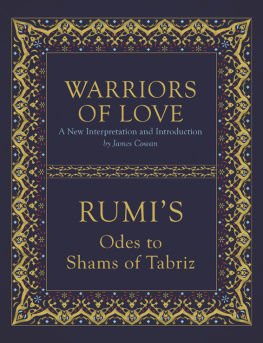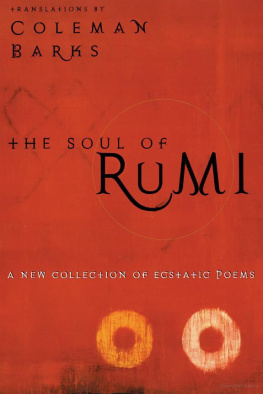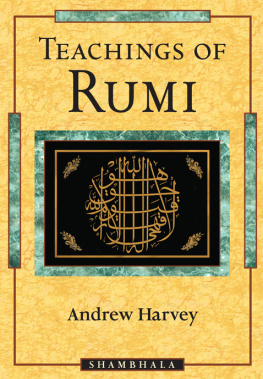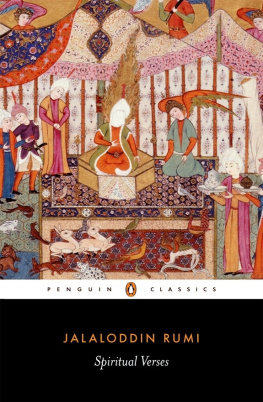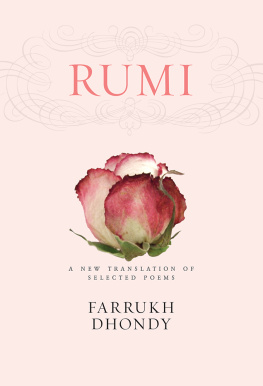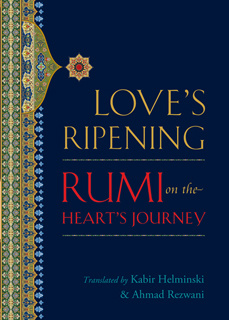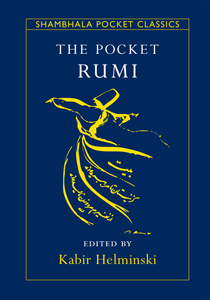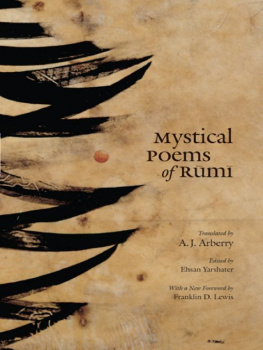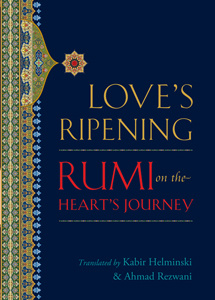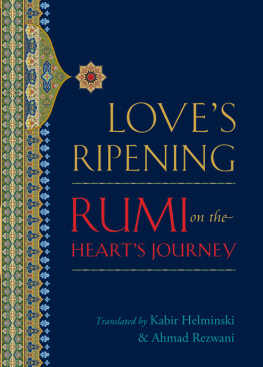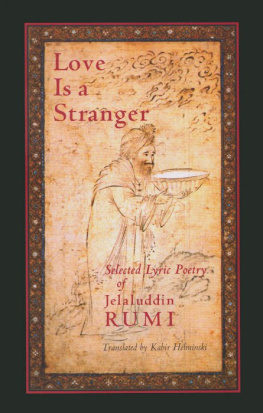Mevlana Rumi - Warriors of Love
Here you can read online Mevlana Rumi - Warriors of Love full text of the book (entire story) in english for free. Download pdf and epub, get meaning, cover and reviews about this ebook. year: 2017, publisher: Watkins Media, genre: Art. Description of the work, (preface) as well as reviews are available. Best literature library LitArk.com created for fans of good reading and offers a wide selection of genres:
Romance novel
Science fiction
Adventure
Detective
Science
History
Home and family
Prose
Art
Politics
Computer
Non-fiction
Religion
Business
Children
Humor
Choose a favorite category and find really read worthwhile books. Enjoy immersion in the world of imagination, feel the emotions of the characters or learn something new for yourself, make an fascinating discovery.
- Book:Warriors of Love
- Author:
- Publisher:Watkins Media
- Genre:
- Year:2017
- Rating:4 / 5
- Favourites:Add to favourites
- Your mark:
- 80
- 1
- 2
- 3
- 4
- 5
Warriors of Love: summary, description and annotation
We offer to read an annotation, description, summary or preface (depends on what the author of the book "Warriors of Love" wrote himself). If you haven't found the necessary information about the book — write in the comments, we will try to find it.
Warriors of Love — read online for free the complete book (whole text) full work
Below is the text of the book, divided by pages. System saving the place of the last page read, allows you to conveniently read the book "Warriors of Love" online for free, without having to search again every time where you left off. Put a bookmark, and you can go to the page where you finished reading at any time.
Font size:
Interval:
Bookmark:
WARRIORS
OF LOVE
WARRIORS
OF LOVE
RUMIS
Odes to
Shams of Tabriz
MEVLANA JALALUDDIN RUMI
A New Interpretion and Introduction
by James Cowan

He asked: What are your intentions? I replied: Constancy and friendship.
Mevlana Jalaluddin Rumi
CONTENTS
INTRODUCTION
 1
1 
Your love has made me drunk, my hands are trembling.
I am intoxicated. I dont know what Im doing.
Mevlana Jalaluddin Rumi
Hearing these words echo in my thoughts that evening as the bus entered the wintery streets of Konya in central Turkey, I somehow knew how Mevlana Jalaluddin Rumi must have felt. My hands too were trembling, indeed sweating a little, in spite of the snow scattering like disturbed butterflies before our headlamps. Two elderly peasant women lounging in the seats opposite peeled apples and carefully ate everything, including cores and seeds. Across their laps a child slept, oblivious to the feast. They had travelled like this all the way from Istanbul, their mutual silence redolent with the aroma of new apples.
So divine and unabashed, Rumis words of apparent confusion continued to run through my mind as we headed towards the bus terminal. They represented the beginning of my own encounter with one of the true masters of Persian poetry, a man who had made his love of another the cornerstone of his quest for union with God.
I dont know why I felt the need to visit Rumis tomb in Central Anatolia. After all, he had died over 700 years ago, and his remains would be no more than dust. Yet there was some quality about his personality which drew me into the remote steppes of what had once been the heartland of the Seljuk Empire. Like him, perhaps, I was drawn by the prospect of gazing upon the minarets of this ancient capital, a city renowned as a spiritual centre long before Rumi and his family had ever settled here. The entire region had once witnessed a confluence of peoples, ideas and religions, much as Jerusalem had done before it. Christian had lived alongside Moslem; Crusader alongside Saracen; Turk alongside Arab, Jew and Byzantine. For Konya had been the hub of a wheel whose axle extended far beyond this rutted land of Rumi, scene of so many wars and conflicts over the centuries. It was a city dedicated to the spirit a city ripe for the nurturing of a young man into a poet, and a poet into someone who to this day is looked upon as the most savoured fruit of Islam.
Mevlana Jalaluddin Rumi, the greatest mystic poet of his age, was born at Balkh in the northern province of Khorasan in AD 1207. He came from a family of jurists and scholars. His father, Bahauddin Muhammad ibn al-Husain al-Khatibi al-Baqri (11481231), was a man of considerable learning, who bore the title King of Scholars (Sultan-ulUlema). However, Rumis scholarly father grew up in an era hostile to metaphysical inquiry. This hostility had been provoked by an attack on philosophy by many contemporary theologians under the spell of Aristotelian thought, led by such men as Ibn Sina (Avicenna). The noted philosopher al-Ghazzali (died AD 1111), who himself underwent a spiritual crisis late in his life which forced him to explore the practices of Sufism more deeply than hitherto, successfully attacked these rationalists, earning for himself the title Argument of Islam (Hujjat-ul-Islam) in the process.
Such was the influence of the rationalists, however, that Rumis father found it difficult to teach with impunity. Though the Shah of Khorasan admired his gifts, on one occasion sending him the keys to his treasury as a mark of respect, he soon found himself maligned by one of the Shahs own courtiers, the rationalist philosopher Fakhruddin Razi. The relationship between Bahauddin and Razi became so strained that the former decided to quit the kingdom with his family and journey to Nishapur. His decision to leave may also have been influenced by the Mongol invasions under the leadership of Genghis Khan, which were already devastating much of the region. Political instability, combined with intellectual harassment, finally forced Bahauddin to seek another haven for his family in 1213.
Rumi would have been a boy of about five at this time. The great teacher and celebrated poet, Ferideddin Attar, welcomed their caravan to Nishapur in the hope that Bahauddin might be persuaded to stay and teach in the home of his forefathers. But it seems that Rumis father was intent on making the pilgrimage to Baghdad and Mecca, an obligation for all Moslems at some time in their lives. It appears that Attar was deeply impressed by the young Rumi while he was in Nishapur and made a gift to the boy of his own work, the Book of the Mysteries (Esrarname). It is said that Attar, watching Rumi depart a few steps behind his father on the road to Baghdad, remarked to one of those with him: What an astonishing sight! There goes a river dragging a mighty ocean behind it. Here was the first intimation of Rumis unfathomable effect on all those who met him. Clearly that quality of baraka (grace) already permeated his being.
There followed a period of wandering which lasted 16 years, before the party finally reached Konya. During this time the family visited Baghdad, Mecca, Medina, Jerusalem, Damascus, Arzinjin and Larinda. These were the sites traditionally visited by learned Moslems, and so formed the mandatory pilgrimage for any scholar such as Bahauddin. Meanwhile, at 18, Rumi married his childhood friend Gevher Hatun, the daughter of one of his fathers closest friends, whose family had accompanied them on their journey. Soon after, his first two sons, Sultan Veled and Aladdin Chelebi, were born. Throughout these years Rumi continued to sit at the feet of his father and his followers, learning everything possible about the mysteries of the Islamic faith. His contact with wise philosophers in all the great capitals of the region further deepened his understanding. The family reached Konya in 1229, and on the death of his father two years later Rumi was ready to receive the mantle of King of Scholars.
The hagiography surrounding Rumis early life and education amply serves to reinforce the idea that he was touched by God. During the next ten years he dedicated himself to intensive study under one of his fathers close friends, Burhanuddin. He travelled back and forth to Damascus and Aleppo, two important centres of learning in the 13th century. Here he met with such men as Kamaluddin, who taught him all they knew. It was only after he had completed a course of mortification and ascetic practices lasting 120 days, under the guidance of Burhanuddin, that his master believed the younger man had attained to absolute purity. Burhanuddin remarked to him: You were unparalleled in the realm of rational, traditional, spiritual and acquisitive knowledge. Now at this moment you find yourself unsurpassed in the knowledge of divine secrets. At 34, Mevlana Jalaluddin Rumi found himself a spiritual leader among men, a khalifah or vice-regent of God on earth.
One would assume at this point that Rumi was the ideal embodiment of the young spiritual. Learned beyond his years, blessed with family connections that linked him to many of the ulema of the Middle East, already the head of a flourishing ascetic community and small
Next pageFont size:
Interval:
Bookmark:
Similar books «Warriors of Love»
Look at similar books to Warriors of Love. We have selected literature similar in name and meaning in the hope of providing readers with more options to find new, interesting, not yet read works.
Discussion, reviews of the book Warriors of Love and just readers' own opinions. Leave your comments, write what you think about the work, its meaning or the main characters. Specify what exactly you liked and what you didn't like, and why you think so.

